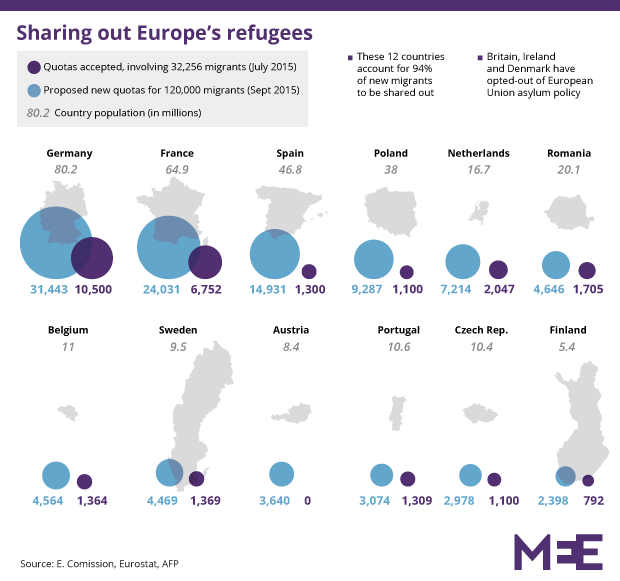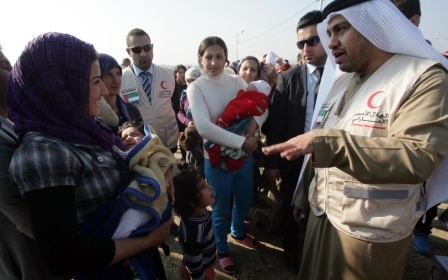Croatian president issues warning as 7,000 refugees enter in 24 hours

Croatia is struggling to deal with more than 7,300 refugees and migrants who have entered the country in just 24 hours, local media reported.
The country has now said that it expects more than 20,000 refugees and migrants will arrive over the next two weeks as people scramble to find alternative routes to Europe after Hungary closed the border with Serbia early on Tuesday and clashes with police broke out on Wednesday.
"We expect a peak within the next two weeks ... over 20,000 migrants," Health Minister Sinisa Varga said, quoted by the state-run HINA news agency.
The situation has sparked concern with President Kolinda Grabar-Kitarovic saying that the country was struggling to cope with the influx.
“Yes, of course, Croatia has shown its human face but I’m stressing that we have to prioritise the safety of the Croatian border and the stability of the country. I think that on the first day of uncontrolled [borders] a too large a number of refugees entered,” she said, while adding that it wasn’t necessary for people to enter in such large numbers.
Almost 1,000 are people now reported to be waiting at a small border train station, Tovarnika, just a few kilometres from the Serbian border. According to local media the situation was growing increasingly tense with some refugees and migrants threatening to break through police barriers if trains did not arrive soon to take them on to migration camps.
Croatia “simply cannot satisfy the needs and care for these people,” Grabar-Kitarovic said.
“It’s very bad that they come in over the cornfield. The border is not functioning as it should and I am resolutely trying to ensure that we introduce strong oversight over the national border in order that [refugees] exclusively cross over official border crossings.”
Concern has also been high that the refugees who cross informally could get caught up in border mine fields left over from the Yugoslav wars in the 1990s.
On Wednesday, Grabar-Kitarovic’s government said that it would allow refugees to come in would not restrict their access, although they said that they were only prepared for several thousand new arrivals.
Under EU asylum rules, applicants must be fingerprinted in their country of arrival and their application processed there, leading many potential asylum seekers to try and avoid detection in places like Hungary and Greece, in order to not hinder their chances in countries with more generous asylum systems like Germany.
Serbian news site Blic reported that many of the refugees who had entered Croatia were still making their way north into Hungary.
Hungarian Prime Minister Viktor Orban has now said that he will order the building of a new border fence with Croatia after work is completed on the barbed-wire barrier with Serbia and Romania.
"Obviously the route no longer goes over the Hungarian-Serbian border," Orban told Austrian newspaper Prese. "Because of this, we have decided to build a wall with the border with Romania, and also in some specific places along the Croatian border."
The crisis began when Hungary closed the border with Serbia in effect cutting off the so-called West Balkan migrant trail early on Tuesday. The closure forced refugees already in Serbia – which is not an EU state - to try and seek new avenues into the EU.
The Serbian government has called on Hungary to re-open the border. They have also urged the EU to clarify its disjointed policy toward migrants.
Plans to agree on EU-wide quotas collapsed earlier this week but a fresh meeting has been scheduled for next Tuesday.
The European Commissioner for Migration, Dimitris Avramopoulos, said in comments published on Thursday that he was "fairly optimistic" that a deal would be met this time around, although some member states, notably Hungary and Poland, have fiercely rejected previous calls to take in refugees.
The European Commission has proposed that the EU states distribute 160,000 refugees between them, based on a quota system that takes into account population size and economic strength.
Germany alone thinks that it could receive up to one million people who have fled their homes before the end of the year.
Stay informed with MEE's newsletters
Sign up to get the latest alerts, insights and analysis, starting with Turkey Unpacked
Middle East Eye delivers independent and unrivalled coverage and analysis of the Middle East, North Africa and beyond. To learn more about republishing this content and the associated fees, please fill out this form. More about MEE can be found here.






